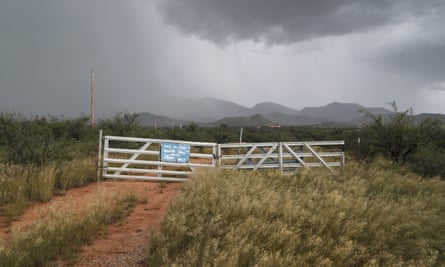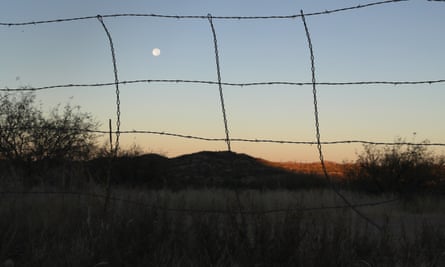It was August, and Katalina stood sobbing in the middle of the cell at the La Palma immigration detention center. She tried not to touch anything – she had seen guards escort out a man who was coughing and trembling just minutes before.
It felt like punishment. Shortly before, she had reported being sexually harassed by another detainee in a male unit of the La Palma correctional center in Arizona where they were being held. Now, she was standing in an isolation cell.
Katalina was worried about contracting Covid-19. The cell she had been placed in hadn’t been cleaned. After standing in the room for five hours, she withdrew her complaint. She had heard that other detainees had spent weeks in segregation after speaking up. It was a risk she wasn’t willing to take.
When a detainee grabbed her arm and left a bruise a few months later, Katalina didn’t say anything either.
Covid has torn through immigration detention centers across the United States. Since the start of the pandemic, at least 7,202 people held by US Immigration and Customs Enforcement (Ice) have been infected with the virus, and at least eight have died. LGBTQ+ populations in immigration custody have echoed the stories of other detainees who have complained that Ice has failed to institute adequate protocols to curb the spread of the virus and has not provided ample protective equipment and medical care. But LGBTQ+ people in La Palma say the pandemic has created further challenges, making it harder for them to escape the gender-based harassment and violence many of them have long faced while locked up.

Katalina, 27, had left Guatemala in April 2019, after a criminal organization tried to kidnap her because of her gender identity. She was detained after crossing the border near San Luis, Arizona, and was transferred to La Palma, an immigration detention facility run by the private corporation CoreCivic. There, she was placed in a unit for men, where she faced discriminatory insults, sexual advances and physical assault from other detainees on a daily basis.
“I decided to migrate to this country thinking that it would be different but instead it was more difficult,” said Katalina, whose full name the Guardian is withholding because of her asylum case.
The coronavirus pandemic added fresh fears. She already had anxiety, hypertension, and tachycardia (a rapid heart rate) and was worried the virus could hit her particularly hard. La Palma has registered more cases than any other Ice detention facility in the US. By 16 November, the center had recorded more than 450 cases.
In October, Katalina and several other transgender women at LaPalma wrote a series of public letters denouncing their treatment by Ice. They say officials have done little to address the harassment and discrimination they face. And they say La Palma’s inadequate response to the coronavirus crisis is compounding their misery.
Harassment in custody
Trans and queer populations in immigration detention have long complained of persistent sexual harassment. Back in 2015, the US Department of Homeland Security stated in a memo that trans people held by Ice need to have access to mental health treatment and hormone therapy and should be housed according to their gender identity.
In the past, Ice had some dedicated units for trans people, but in practice, many trans and LGBTQ+ people are still assigned to units that correspond with their sex at birth. There are 31 self-identified trans people, including Katalina, in detention nationwide, according to Ice figures. Reports of discrimination by staff and medical negligence remain prevalent.
LGBTQ+ people are 97 times more likely to be victimized within detention than other detainees, according to a 2017 Center for American Progress analysis. When people do report abuse, there is often no follow-up to tell them about the outcome of their grievances, said Lori Williamson, the outreach coordinator of Transcend Arizona, an organization that assists and supports LGBTQ+ people inside and outside detention.
The pandemic has magnified those vulnerabilities. Experts and advocates have warned that the lockdown of facilities to curb the spread of the virus is making it harder for victims to escape abuse since they often end up locked up with their aggressors. “The ability to social distance and keep yourself safe is nearly impossible when you are in a place where every moment of every day you are at risk for physical and sexual violence,” said Lynly S Egyes, the legal director of the Transgender Law Center.

At the same time, advocates have warned, victims have been less likely to report abuse out of a fear that officials will respond by segregating them from the general population, said Karla Bautista, the liberation coordinator for Trans Queer Pueblo, an advocacy organization for LGBTQ+ rights in Phoenix.
Ice describes administrative segregation as a way to protect people who are vulnerable because of their gender identity. But LGBTQ+ and civil rights groups see the practice as inhumane, arguing it resembles solitary confinement. “When a person is detained for 23 hours a day and their only interaction is when someone hands them their meal, that is solitary confinement. Ice can call it one thing. They can dress it up in whatever they want. The reality is solitary confinement and administrative segregation is the same thing,” said Egyes, the Transgender Law Center’s legal director. “It is a punishment. And if Ice cannot keep people safe in the general population, they should be released.”
‘I cried every day’
José Arellano, a 31-year-old asylum seeker from Mexico who signed the public letters, said he had been sexually assaulted by one of his cellmates in La Palma. Arellano, who is gay, said he told guards about the August incident but didn’t receive a response from Ice or CoreCivic. A few days before that, he said, a supervisor at the detention center’s kitchen yelled derogatory statements about Arellano’s sexuality. “I felt humiliated by the way I was discriminated against,” he said.
Ryan Gustin, a spokesman for CoreCivic, said the company corroborated Arellano’s allegations about discrimination and that the supervisor that worked through a contractor was fired. Gustin said they informed Arellano that his grievance had been resolved, but Arellano said no one told him anything.
Like Katalina, Arellano said Covid has pushed his situation in detention to the brink. Held for a year, he developed depression and thyroid problems while detained and is worried about his outcome if he were to contract Covid-19. He has petitioned to be released because of his health complications, but Ice has denied his requests.
Emma, a 22-year-old trans woman from Honduras held at La Palma, said she would receive inappropriate and unsolicited letters from other male detainees, and that guards would often laugh when she told them about it. She said she got sick with Covid-19 in June, and was nauseous, had chills and struggled to breathe. She was put in medical isolation for nine days, she said, and spent four of them in a cell where she didn’t see the sunlight, slept on a thin mattress on the floor and wasn’t able to shower or have her belongings. She only saw other people when someone brought food to her cell. She learned she had tested positive for Covid when she emerged from isolation.
“I fell into depression, I cried every day, I felt like I wanted to die at that moment,” said Emma, whose last name the Guardian is withholding because of her asylum case.
An October ruling forced Ice to update its policies and differentiate medical isolation and quarantine from solitary, segregated or punitive housing. And the agency’s own rules forbid housing healthy detainees with people showing symptoms of Covid-19. But according to advocates, Emma’s coronavirus experience is common. Ice says it places people who have tested positive for Covid-19 or with symptoms in medical isolation following Centers for Disease Control and Prevention (CDC) guidance, but Eunice Cho, the senior staff attorney at the ACLU’s National Prison Project, said her organization had seen “a tremendous use of abuse of solitary confinement where people are not being told about their health status”.
Both Ice and CoreCivic said in a statement that they do not tolerate sexual harassment. Ice said it took “very seriously allegations of misconduct in its detention facilities. The agency holds its personnel and contractors to the highest standards of professional and ethical behavior. When the agency receives a complaint, the matter is investigated thoroughly to determine its veracity and to ensure that the comprehensive standards, which ICE is required to follow under various national detention standards, are strictly maintained.”

An Ice spokesperson also said the agency could not comment on Katalina’s accusations of sexual harassment within the facility and officials mishandling the coronavirus crisis due to pending litigation and that “lack of comment should not be construed as agreement with or stipulation to any of the allegations”. Although they confirmed that Emma had tested positive for Covid-19 and was placed in isolation they did not respond to her allegations of mistreatment.
Gustin, the CoreCivic spokesman, said on Monday company officials had taken appropriate action in response to Arellano’s grievances and would meet with him to inform him of “all actions taken to handle his concerns”.
Katalina, Emma and Arellano lost their asylum cases and have pending appeals, according to their attorneys. They have filed several requests to be released from detention on humanitarian grounds. Both Katalina and Arellano hope their release could be reconsidered through a legal ruling affecting people with pre-existing health conditions such as diabetes, heart problems, hypertension and severe mental health issues. Katalina’s attorneys at the Florence Immigrant & Refugee Rights Project said on Monday they expect she will be released in the coming days in connection with the ruling.
“There are days that I can’t stand being locked up any more,” Katalina told the Guardian before news of her possible release.
Emma remains in Ice custody, and her case is not affected by the ruling around pre-existing conditions.
She found some hope in the news that Democrat Joe Biden had won the US presidential election. “I feel very good about it because he talks a lot about supporting immigrants,” she said. Biden has said he is in favor of case management for LGBTQ+ people as an alternative to the long-term immigration detention policies of the Trump administration.
But Emma still lives in fear of harassment every day. She has trouble breathing, she said, and is afraid of getting sick again. She is depressed, but doesn’t want to tell officials out of fear of being segregated again.
“All I did was come to the US looking for protection, but what I found was the opposite,” she said.
